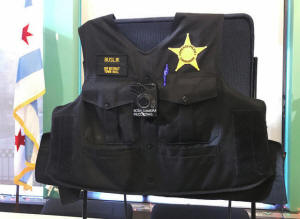|
Chicago police body-camera rollout to be
finished early: mayor
 Send a link to a friend
Send a link to a friend
 [December 29, 2016]
By Renita D. Young and Timothy Mclaughlin [December 29, 2016]
By Renita D. Young and Timothy Mclaughlin
CHICAGO (Reuters) - Chicago will complete
the rollout of body-worn cameras for its police officers a year earlier
than planned to increase transparency and rebuild trust in a department
currently under a federal civil rights investigation, the mayor said on
Wednesday.
The new timeline has all officers wearing the cameras by the end of
2017, Mayor Rahm Emanuel said.
Emanuel has worked to overhaul the police force, which has about 12,500
sworn officers, in the wake of the investigation, introducing a new use
of force policy and pledging to add nearly 1,000 officers. A body camera
pilot project was launched in January 2015.
A number of high-profile misconduct incidents, most notably the release
in 2015 of a video of the fatal shooting of black teenager Laquan
McDonald by white officer Jason Van Dyke, has thrust Chicago into a
national debate over police use of force, particularly within minority
communities. The U.S. Justice Department is conducting the probe of the
department.

"Body cameras, while not a panacea, are a win-win for officers and the
public," Emanuel said in a statement. "They provide a firsthand look at
the dangerous situations officers encounter on a daily basis, and
improve transparency while building trust."
The union representing Chicago police officers voiced displeasure over
the lack of communication about the accelerated rollout of the cameras.
The union would prefer a broader range of footage released so the public
also sees video showing mistreatment of officers, union president Dean
Angelo Sr said in a telephone interview.
"We don't see the encounters that are challenging, disrespectful and
borderline illegal, threatening someone in uniform just because they are
in uniform," he said.
[to top of second column] |

A vest outfitted with the new body camera is shown during a
demonstration by Commander Marc Buslik at the 19th District police
station in Chicago, Illinois,
U.S., on December 28, 2016. REUTERS/Renita Young

At a Wednesday demonstration, police Commander Marc Buslik said he
was most concerned with the cameras invading the privacy of crime
victims or bystanders during police encounters.
Buslik could not detail the amount each police camera will cost the
city since the accelerated plan was not originally in the 2017
budget, but said the mayor's office had the funds to pay for it.
All patrol officers will be trained to turn on body cameras whenever
they make a personal encounter, he said. For those who do not,
disciplinary action has yet to be determined.
In July, a Chicago police officer killed a black teenager after he
stole a car, but the fatal shots were not captured because a
policeman's body camera was not recording.
(Editing by Ben Klayman and Matthew Lewis)
[© 2016 Thomson Reuters. All rights
reserved.]
Copyright 2016 Reuters. All rights reserved. This material may not be published,
broadcast, rewritten or redistributed.
 |